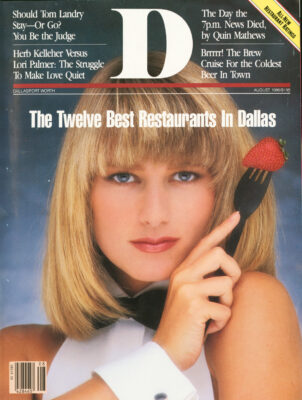Bankers do it. Lawyers do it. Even the guys at EF Hutton did it. And Dr. Paul Mok, chairman of the Richardson-based Training Associates, says it is costing U.S. businesses billions. “It” is ethics violations.
And Mok isn’t just talking about the guys who run off to Rio with the company treasury. The ethics violators are people like you and me-well, you anyway. Folks who use the company postage machine for that personal note to a friend (written on company stationery). Remember that folder you brought home from the company supply room for your kid’s social studies report? What about that long phone call to your buddy in Seattle on the company Sprint line? Maybe you’ve never padded an expense account, but you know someone who has. Following the scandal that culminated in EF Hutton’s plea of guilty to 2,000 counts of fraud because of check kiting, EF Hutton & Co. Chairman Robert Fomon said: “I never thought ethics was something that could be formally taught. I thought ethics was something you learned growing up at home, in school, and in the church.”
Well, Paul Mok is here to tell us that we can all learn to be ethical. Yes, it will cost about $50 per employee for testing, then $150 per person for an ethics seminar, and maybe some follow-up sessions for some more dollars. But what’s that compared to the thousands that pilfering is costing your company and the potential damage of a large-scale scandal?
Back in the Seventies, Mok developed a test based on Jun-gian personality types (the individualist, the rationalist, the social person, the competitor) and how they would communicate with each other. He’s sold more than 500,000 copies of that test, and it has been used by more than 5,000 companies worldwide, including some very prominent clients like IBM, ITT, Pepsico, and Proctor & Gamble.
From his findings, Mok estimates that only 26 percent of the population-the rationalists-are naturally ethical in behavior. The rationalist’s value set is characterized by a heavy emphasis on laws, rules, regulations, and established authority. Not only is this type of person least likely to steal from the company (he may even leave company fountain pens in his desk at work), he also tends to snitch on those he sees doing wrong. The other 74 percent of the population are somewhat less reliable. One type, motivated by “social” values, will use the company equipment to help a friend. Someone else will play Robin Hood, taking supplies from the hospital where she works and giving them to the needy. Her individual value system says it’s okay, even though she is stealing from the hospital.
Mok’s test is called the Situa-tional Perceptions-Observations Test (SPOT). It determines what ethical type a person is from his responses to situations under both normal and stressful circumstances. Ethical questions are posed, and the subject chooses a response that most closely matches what he would do. Try it:
“If a friend told me he/she was padding his/her company expense account for ten dollars, I would probably:
1. advise the person not to;that he is stealing and shouldnot do it.
2. figure this is common prac-tice even if it isn’t right.
3. figure each person is tryingto survive the best he can.
4. try not to be judgmental andsee if I could help.”
After answering eighteen such questions, Mok can tell a person if he’s Individualist (“Rules are made to be broken”), Rationalist (“Morality means law and order”), Social (“Morality is a personal issue”), or Competitive (“Winning is IT!”).
What does a company do with the information?
“In the seminar [that follows testing] you talk about people’s differences. People will realize that they may have a value system different from that guy or this guy. None is necessarily right, but you can’t run a company on that basis. There have to be some common, agreed-upon rules that you are going to follow as a group,” Mok says.
The most important accomplishment of the seminar, Mok says, may be letting employees know that the company is concerned about ethics. It makes them think about “it.”
Mok wants to help. But so far, he hasn’t had any local takers for his program, and he’s getting a little frustrated with Dallas companies. Looking around Dallas for clients, Mok hasn’t found one with a specific ethics program in place.
But Mok has sparked some interest by Dallas companies in ethics programs. They may not be willing to commit their money, but they are asking Mok who else is paying tuition to ethics school.
The companies willing to lay down the dollars, Mok tells them, are those that have already been stung. Several large corporations have ethics programs, like Allied Corporation, McDonnell Douglas, General Dynamics, and, of course, EF Hutton. “Dallas is conservative when it comes to embracing new training and testing. Corporations are afraid to talk to their employees about ethics. It’s taboo. It’s like talking about sex. They are afraid they’ll insult them,” Mok says.
Get our weekly recap
Brings new meaning to the phrase Sunday Funday. No spam, ever.
Related Articles

Arts & Entertainment
DIFF Preview: How the Death of Its Subject Caused a Dallas Documentary to Shift Gears
Michael Rowley’s Racing Mister Fahrenheit, about the late Dallas businessman Bobby Haas, will premiere during the eight-day Dallas International Film Festival.
By Todd Jorgenson

Commercial Real Estate
What’s Behind DFW’s Outpatient Building Squeeze?
High costs and high demand have tenants looking in increasingly creative places.
By Will Maddox

Hockey
What We Saw, What It Felt Like: Stars-Golden Knights, Game 2
It's time to start worrying.
By Sean Shapiro and David Castillo


